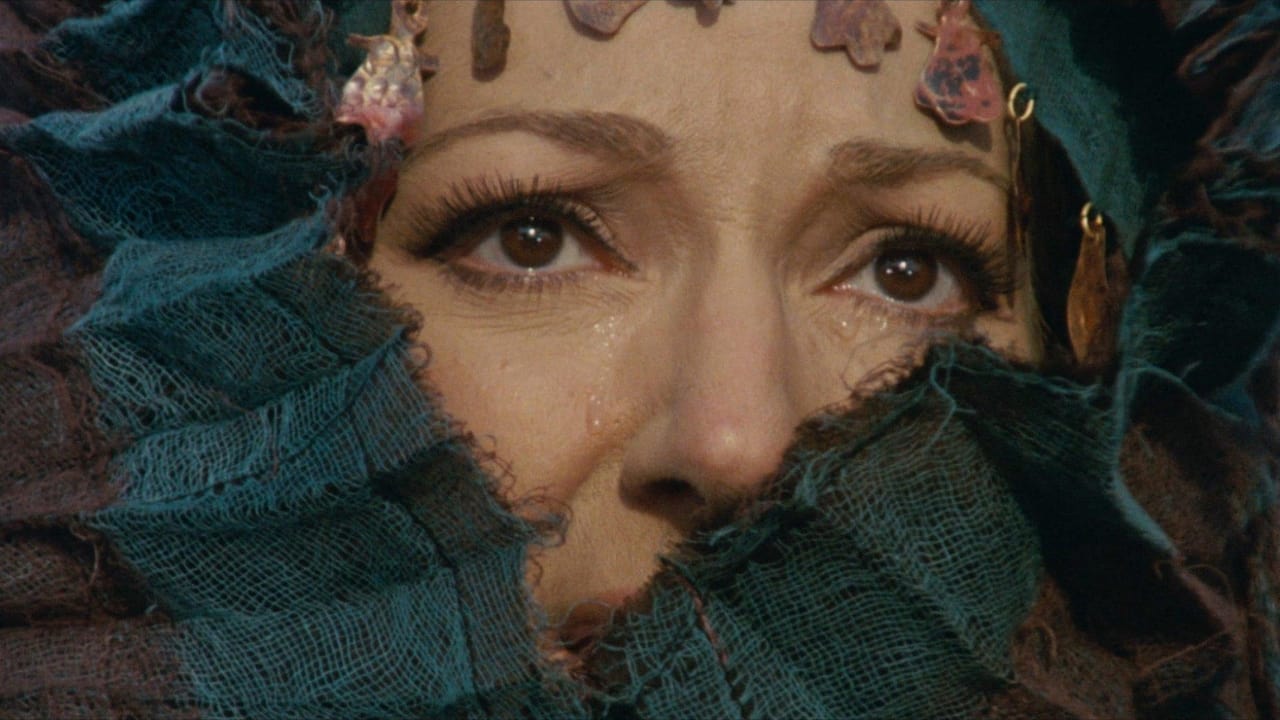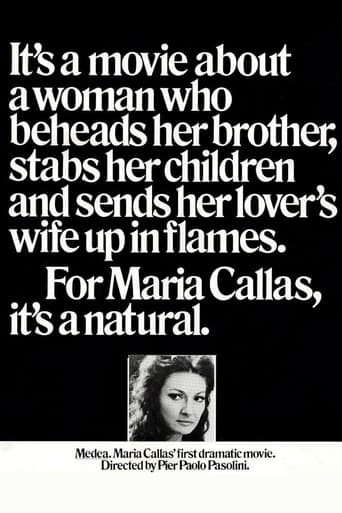



Really Surprised!
Expected more
n my opinion it was a great movie with some interesting elements, even though having some plot holes and the ending probably was just too messy and crammed together, but still fun to watch and not your casual movie that is similar to all other ones.
View MoreOk... Let's be honest. It cannot be the best movie but is quite enjoyable. The movie has the potential to develop a great plot for future movies
View MoreThe parable of the story of Medea is known: It is the hatred of a woman. Jason, son of King Aison, is searching the Golden Fleece by whose power he intends to push his uncle Pelias from the throne which he had gained unlawfully. When Jason arrives in Kolchis, he meets Medea who immediately falls in love with him and helps him to get the Golden Fleece. Returned to Jason's homeland, they get married. Medea gives birth to two children, but the end of happiness is already in sight. Because of ambition, Jason abandons his family in order to marry Glauke, the young daughter of the king of Korinthos. Medea, blind with jealousy, takes gruesome revenge. She kills her children, minces Jason's father and poisons Glauke's children.However, Pasolini would not be Pasolini if he would just film an ancient Greek myth that belongs since centuries to the common knowledge of any learned European. Pasolini himself wrote: "The film deals with the conflict between the old religion and the atheist modern world". As if he wanted to underline his breaking off the original parable, he substituted the Greek costumes by African ones. Africa was in Pasolini's focus at least since 1971, when he began shooting his documentary "Le mura di Sana'a". By changing not only the original meaning of the Medea-parable, but by transferring the area of the play to the black continent, Pasolini also gave as a further interpretation of the Medea-parable the abyss between the Third World and the colonialist West.
View MoreI first saw Medea in college and was highly critical of it, finding it disappointing on almost all counts: terrible sound editing, cheap film stock, over bright lighting, bizarre, amateurish acting styles, inadequately edited, etc. Then there was the extended murder scene of Glauce and Creon going seemingly on forever, and then . . . wait; what's this? It's repeated all over again? Did someone get the wrong reel into the house?Another ten years went by before I watched it again and after the second viewing, found myself emotionally drained, my jaw on the floor with the realization that I'd just finished a film that alternately horrified, fascinated and astonished me.Medea is a grim, violent, film, minimally processed which only adds to its gruesome, wild rawness. This is Pasolini's Medea, not Euripedes and it is not easy viewing. Its wild, African/Middle Eastern score with the nasal bleating of women's voices in near pre-historic sounding rhythmic chant adds further to the element of being "out there" this film produces: This is about as far away from popular cinema as one can get. Medea doesn't easily compare to films of any other style or genre; not even with some of Pasolini's other work. But, if you can succumb to its hypnotic, mesmerizing pace at once both frenetic and static - you will realize this is as about as close to a hallucinatory experience one can achieve without the use of an illegal substance. Granted, not everyone wants that experience.As Medea, Callas is simply amazing. Oddly, when the film came out she was roundly criticized for not being able to transfer the magic she so naturally gave on stage to the big screen. I will strongly disagree. The more I watch this film (which is probably several times a year for well over a decade), the more amazed I am by her performance in it. Where I, too, had first been critical of her languid weirdness, I've grown to see her commitment to the role. I've come to be riveted to her painfully expressive mask as she completely inhabits this character who is, quite literally, capable of everything (yes - everything is the right word here).Where I was once critical of the lighting, I've grown up to realize what Pasolini did; why he chose to film at the times of day he chose, and the resulting, fascinatingly brutal and surreal luminosity that bathes the entire film and the almost palpable sense of its visual texture. Stunning. The landscapes Pasolini chose to film in are as brutal and as vital as the characters of the tale. His near excision of all spoken text ( the screenplay is nearly dialogue free) brings us into a timeless, yet somehow ancient world where all is understood without the use of verbal communication. The savage, bloody rites of sacrifices for fertility and harvest initially seem barbarous then become somehow beautiful and fascinating. Then they make one cringe with the realization of how, not so long ago, this was us.A remarkable, savage and beautiful film.
View MorePasolini began his revisiting of the old myths with "gospel according to St Matthews" ,perhaps the best rendition of Christ's life on the screen,then tackled the Greek legends ,first "Edipe Re" then "Medea"."Edipe Re" was framed by a prologue and an epilogue which took place in this day and age."Medea" displays two worlds colliding:Jason's one,a rational world where science begins to surface,and Medea's one,which is that of superstition,magic, a world that is to disappear.The legendary Golden Fleece is nothing but an old rag.And Pasolini does not show the ending of the legend when Medea flies away on her chariot;it's neither a Hollywoodian film ,nor one of those peplums Italian directors used to make by the dozen ten years before.The centaur -played by earnest thespian Laurent Terzieff- ,the only concession to some kind of show,looks like an ordinary character.Some users pointed out the primitive side of the background.But let's not forget that there are two degrees:Medea's world is primitive to the core;Jason's one is attaining what we call civilization.
View Morethis film sticks in my mind as one of the greatest by far i've ever seen, for the drive and weirdity is beyond estimation; most peculiar, plus divinely inspired and escatalogically rendered, so potent grand!the section where medea doubles the murder in two different ways flipt me, and so drove me crazy, and caused the most excited response to a movie i've encountered. including those devastating images from ikuru while the old bureaucrat is snubbed and proclaims no time for anger, and the harp of burma when the musician soldier finds the bodies on the beach, and thru the glass darkly when the daughter in the boat wrecked on the shore resigns in the flash it's terrible to understand your own insanity; those can't quite measure up, tho all those films are so brutally exquisite, carrying image and emotion and realization solid.when pasolini hits that scene again, i rose out of my seat and yelled!
View More